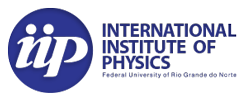Please be aware that the International Institute of Physics, IIP, never contacts the participants to ask for credit card or similar information. Participants are expected to pay for their travel and accommodation by themselves unless they qualify for financial support. If you have any questions, please contact IIP events department at events@iip.ufrn.br
School on Biological Complex Networks: From the cell to the brain and beyond
The discovery of the laws governing the structure and dynamics of complex systems is one of the greatest challenges of modern science. These systems are characterized by the presence of different levels of self-organization, each of them determining the behavior of the next. The most important property of complex systems is the impossibility to predict their overall behavior from the knowledge of their individual properties or as if they were isolated system’s components. Understanding and predicting the behavior of these systems is of great importance in Biology since any living system is the result of the complex interaction between their fundamental components. The Science of Complex Systems not only provides a way to answer open questions, but also promotes a new language and the introduction of concepts of great importance for the future.
One way to address the problem of complexity in such systems is by studying their structure and function. During the last decade, important discoveries show that there is a common pattern of self-organization that emerges over and over again in different complex systems. Somehow, the interactions between system elements (species, individuals, genes, proteins, routers) that occur in real systems (physical, biological, social and communication) give rise to networks that share a large number of common features. These are the so-called Complex Networks (Physics Reports 424, 175 (2006)).
Complex networks theory is particularly advantageous to explore several aspects of complexity. The fundamental idea is to discover the structure of interactions between the components of the system and the emergent behavior of many-body systems coupled to the underlying structure. This would improve our understanding and modeling capabilities so that we may control or predict the dynamics and function of complex networked systems. In addition, this approach does not rely on a detailed knowledge of the system’s components and therefore allows obtaining universal results that can be generalized with relative ease (the study of epidemic spreading processes is equivalent to the spread of computer viruses).
The last several years have witnessed a spectacular advance in the field of Complex Networks. Nowadays, we have at hand many outstanding results in this research field, and we have progressed in basic theoretical aspects, especially, in the search of how the generated knowledge can be applied to the characterization and exploitation of real systems. One of the fields that has benefited most from these advances is Biology. Biological networks, in part due to the massive acquisition of data during the last several years at the molecular and cellular levels, have constituted a relevant niche to test concepts of complexity and network science. At the same time, the characterization of real biological systems has fed back into new models, theoretical tools and numerical techniques, enriching our current knowledge of complex networked systems.
The functioning of many biological systems finds nowadays a suitable framework of representation as the outcome of a network of interconnected dynamical units. On the other hand, it is manifested that the associated complex functioning and organization of such biological networks is often associated with the emergence of a collective behavior of the entire set of nodes forming the network or the coordination and adjustment between different functional behaviors that take place in different cohesive subgraphs of nodes. A series of relevant issues have therefore emerged, such as understanding the intimate relationship between the topological structure displayed in the resulting graphs, and the mechanisms leading to the arousal of such collective behaviors, or how the modular organization of biological graphs allow them to perform coordinated tasks in a robust and reliable way.
The aim of this International Course is to review the main achievements and ideas developed in recent years, that opened a new way to understand and interpret the functioning of biological systems, starting from the scale of genetic and protein networks, until the larger scale of brain networks and ecosystems. The conclusions of these results are not the end of a fruitful research field but the starting point of forthcoming works that intend to understand, with the tools developed under the framework of Complex Networks Theory, how biological systems organize and evolve.
The topics covered by the course are multi-scale, which enhances the scope of the meeting and makes it of potential interest to a broad audience coming from different fields. The development of new theoretical tools based on the structure and dynamics of complex networks will be of interest to mathematicians and physicists interested in applied sciences. Biologists, neuroscientists and researchers working in medical sciences will be also interested in the applications of such methods to real systems, which could lead to a new analysis of their already recorded data. Finally, the interaction of such a broad audience will be an added value and it will enrich the discussions and potential collaborations that may arise in the framework of the Course.
School fees
Students = US$160,00 / €120,00 / R$ 300,00
Professionals = US$260,00 / €200,00 / R$ 500,00
Registration deadline: May 8th, 2013, 11:59 PM









